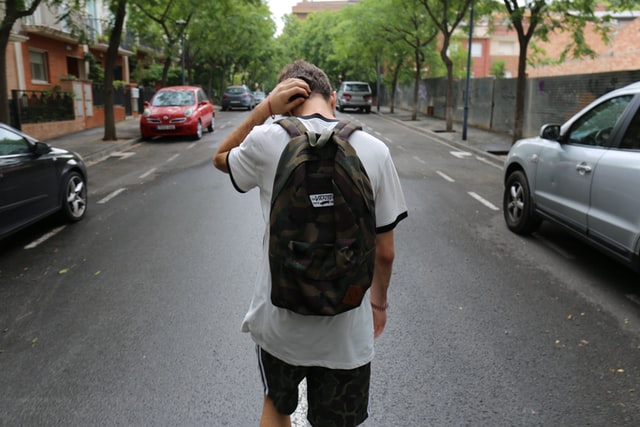It’s important to work with any teenager who is making the transition from youth to adulthood. However, transition planning is usually more involved for teenagers who have autism spectrum disorder. So when should you start a transition plan for a teenager with autism?
Our son J is now in his middle teenage years, and while we have done some planning for his future and through the Individualized Education Plan (IEP) process at his school, I know there is so much more that I need to do. He really wants to work in video production, which has been an underlying passion no matter what his special interest has been since he was young. He will have the ability to obtain community college credits through certain classes his junior and senior years of high school toward an associate degree in visual communications. Then he plans to finish up that degree at our local community college right after high school, and then transfer to the school’s four-year university partner to finish a bachelor’s degree in media arts. Luckily, he can catch a bus to both schools not too far from our house.
Having that plan in place for his secondary education makes me feel good, yet I know there is so much more to transition planning. J and I have talked about the importance of him getting a part-time job while he is still in high school, and he is even considering looking for one next summer (pending what is happening with the pandemic!). We have found a driver’s education program that has instructors specially trained to work with people with autism. He is not ready yet to learn to drive but hopes to in the next couple of years. I have started ramping up teaching him more about finances. Yet, what legal, health care and other tasks do I need to set up, so he is ready? There is so much to teach him about adulting, and I feel like I’m running out of time before he will need more.
The statistics for young adults with autism are daunting

When I read about the statistics for young adults with autism when it comes to them living well and independently, it makes me sad and realize what a big hill our kids have to climb to be successful in life. According to statistics from Autism Speaks:
- Most of autism’s costs in the United States are for adult treatment and services, estimated between $175 and $196 billion a year. That is compared to $61 to $66 billion per year for children.
- More than a fourth of adults with autism suffer from depression.
- More than 50 percent of adults with autism are unemployed and not enrolled in vocational school or college within two years after high school, which is a lower rate than other disabled adults, including those with an intellectual disability or speech-language impairment.
- Almost 50 percent of 25-year-olds with autism have never had a paying job.
Yet, as parents, we can help our kids be ready for adulthood by working with their schools and taking additional steps to ensure we have a good transition plan in place for them.
What is a transition plan for a teenager with autism?
A transition plan for a teenager with autism from school to post high school is part of the Individualized Education Plan (IEP) process with your child’s school, and the first transition plan should be in place when your child is 14 years old in most states. Your teen’s special services team at their school usually begins the plan in the middle school years by including strengths, weaknesses, future vocational goals and other information in their annual IEP. They then add onto it over the years to include other elements noted below.
How is a transition plan determined?
As part of the process, your child is usually assessed in a few different ways:
- Updated psychological testing – Many kids are diagnosed with autism/ADHD or other conditions when they are younger, so part of the preparation for transitioning to adulthood is to obtain updated testing. This provides updated testing for your teen’s cognitive abilities and IQ, which will be required by certain agencies for benefits. Your child’s school may provide this, or you can obtain it independently.
- Vocational assessment – This type of test will evaluate future career opportunities for your teen based on their abilities and interests.
- Daily living skills/adaptive behavior assessment – This type of assessment will evaluate whether your teen could live independently. If they need assistance, what would that look like?
What does a transition plan include?

A transition plan for a teenager with autism includes many elements. They can be comprised of:
- Plans for secondary education post high school.
- Potential guardianship, depending on whether your child is capable of making their own decisions and providing informed consent.
- Assessment of daily living skills. These include safety, cooking, financial management, time management, work skills, self-advocacy, health management, transportation, and more. Then the development of skills gap and education plan for building skills.
- Employment plan, including type and whether job coaching may be needed.
- Health care needs and transition plan that can include transitioning from child to adult providers. This can include moving from a pediatrician to a family practitioner/internal medicine doctor; teaching them about insurance coverage and managing their health care, including medication; and more.
- Plans for housing and funding options.
- If needed, day habilitation programs.
- Public benefits through state and federal agencies, if needed.
- Long-term financial planning, including wills, estates and special needs trust funds.
What is the parent’s role in your teen’s transition plan?

As a parent, overall we should be the leaders of our child’s transition plan. Your teen’s special services team definitely will provide the framework, guidance, assessments and other tools needed. Yet, we need to be involved and make sure our teens are getting what they need.
At home, make an “adulting list” of activities you need to teach your child. Here are some of the things I have included on my list for our son J. We are currently working on how to:
- Budget, manage a checkbook and create a financial plan
- Use home appliances for cooking, laundry, electronics, yard work and more
- Make a meal plan and grocery list and then shopping for groceries
- Cook simple dishes such as eggs, spaghetti, pizza, casseroles, salads, sandwiches and more
- Stay safe at home and while away
- Plan for transportation. This includes understanding how to use the bus system, putting a plan in place for driver’s education, reading maps, using map apps or GPS, and even using Uber/Lyft
- Get himself up with an alarm and prepare for the day
- Manage his time and schedule for the day, week and more
- Use the Internet safely and understand cybersecurity concerns (e.g., phishing, email and password protection, etc.)
- Handle social situations and continue teaching social skills
- Manage his medications
- Apply for a part-time job and obtain references
- Balance his schoolwork with home responsibilities and his special interest activities
- Do laundry
- Do yard work like mowing the lawn
I know this is only part of everything we need to make sure our teens learn. However, having a list helps me to keep these things in mind as I consider chores and other activities for our son.
How have you handled transition planning for your teen? Do you have any helpful tips to share? If so, leave a comment, so we can encourage each other!







